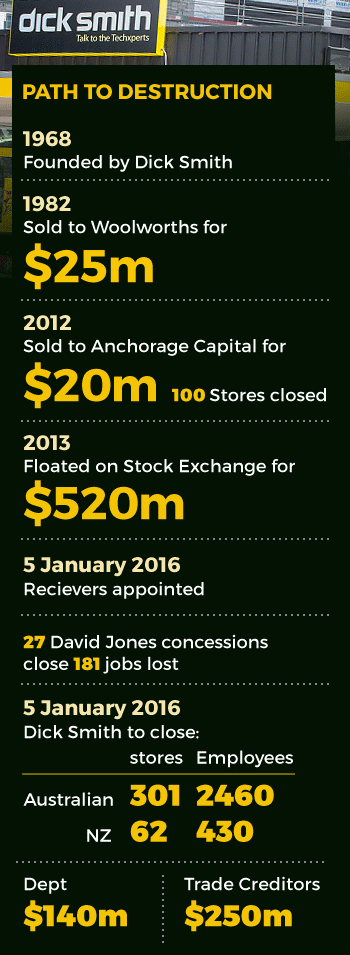Why Aussie icon Dick Smith crashed and burned


Just three years ago Dick Smith, the retailer that has been an electronics byword for two generations of Australians, was worth $520 million.
Now it’s in receivership and its stores will all close in two months, and the man whose name it carries says he’s “incredibly angry” about it, despite not being involved with the business for over 30 years.
“I wouldn’t look at buying back the name but I’m incredibly angry about the utter dishonesty of Anchorage Capital and I hope ASIC and the Senate Inquiry do something about them,” Mr Smith told Fairfax Media.
• All Dick Smith stores to close for good
• Smith ups pressure on Bishop
• Dick Smith to disappear from DJ’s
 The jobs of 2460 staff in Australia and 430 in New Zealand will be lost, gift cards and shoppers’ deposits will not be honoured and $250 million owed mainly to suppliers will be at risk when the group’s 362 stores lock their doors for the last time.
The jobs of 2460 staff in Australia and 430 in New Zealand will be lost, gift cards and shoppers’ deposits will not be honoured and $250 million owed mainly to suppliers will be at risk when the group’s 362 stores lock their doors for the last time.
And unlike the closure of Masters by Dick Smith’s one-time owner Woolworths, don’t expect to see any of the stores reopen under the names of competitors like JB Hi-Fi or Harvey Norman.
Dick Smith was put into receivership on January 5 when its bankers, owed $140 million, feared they wouldn’t be repaid if it continued trading.
Receivers Ferrier Hodgson tried to find buyers for the distressed business but no deal could be done.
No buyers in the wings
“While we received a significant number of expressions of interest from local and overseas parties, unfortunately the sale process has not resulted in any acceptable offers for the group as a whole or for Australia or New Zealand as stand-alone businesses,” said Ferrier Hodgson’s James Stewart.
“The offers were either significantly below liquidation values or highly conditional or both.”
One company believed to have lodged a bid was Indian conglomerate Tata.
Dick Smith staff have been guaranteed their entitlements by the receivers. Retail union SDA’s national secretary Gerard Dwyer told The New Daily “annual leave loading, redundancy payments and accrued entitlements like long service and holiday pay are protected. But this is a very disturbing outcome”.
The recent history of Dick Smith has been nothing short of farce and tragedy. Woolworths, who bought the business from its high-profile founder, Dick Smith, in 1982, ran into problems.
Woolies sold it to private equity group Anchorage Capital for $20 million and a small exposure to any future float.
The name of the game in private equity is using restructures to on-sell businesses quickly and Anchorage certainly did that.
Financial alchemy
One of its secrets was Anchorage’s use of Dick Smith’s cash flow to pay for its purchase and create unrepeatable profits. Matt Ryan, analyst with Forager Funds Management, describes the deal as “the greatest private equity heist of all time”.
He told The New Daily “they bought it for $20 million and sold it (into a share market float) for $520 million”.
The strategy worked like this. Anchorage wrote down the value of old Dick Smith stock which they didn’t replace. They sold the stock off at a discount and that gave them a boost in cash flows of $120 million.

Mr Smith wants an enquiry. Photo: AAP
Because they had written down the value of the old stock, they didn’t have to report a loss on the discount sales when they reported their profit. That in turn meant they could float the company on a multiple of earnings that were boosted by the one-off sales boost.
Despite the inflated values in the float, Mr Ryan said “I didn’t think their demise would be so sudden”. Founder Dick Smith has called for regulators to examine the private equity deal.
It appears the banks have taken advantage of timing in calling in the receivers in early January. Dick Smith’s coffers were boosted by Christmas sales but it would not have paid its suppliers by the time the shutters went down.
That means the banks, whose loans rank before suppliers in the repayment order, have ensured there’s plenty of cash to pay them back. Suppliers, who are owed $250 million, may get returns of only 40c in the dollar, Mr Ryan said.









